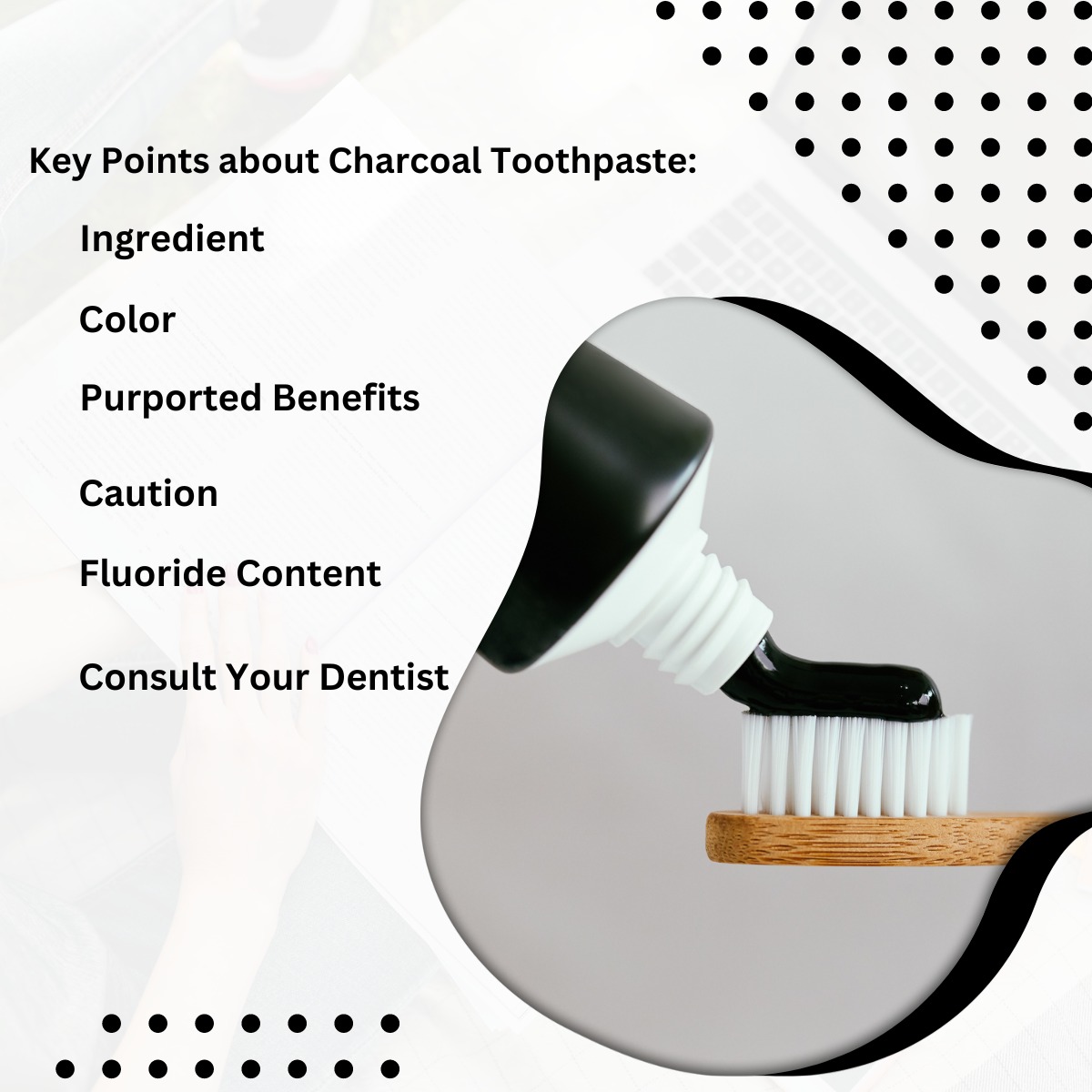What is Charcoal Tooth Paste
Charcoal toothpaste is a type of toothpaste that contains activated charcoal as one of its main ingredients. Activated charcoal is a form of carbon that has been treated to make it porous, increasing its surface area. This type of toothpaste has gained popularity for its purported benefits, but it’s essential to understand its characteristics and use.
Key Points about Charcoal Toothpaste:
- Ingredient: The primary ingredient is activated charcoal derived from sources like coconut shells or wood.
- Color: Charcoal toothpaste is typically black or dark gray due to the presence of activated charcoal.

- Purported Benefits:
- Teeth Whitening: Activated charcoal is believed by some to help remove surface stains on teeth and contribute to a brighter smile.
- Detoxification: Activated charcoal is known for its absorbent properties, leading to the belief that it can absorb toxins and impurities from the mouth.
- Caution:
- Abrasive Nature: Charcoal toothpaste can be abrasive, potentially leading to enamel wear. It’s advisable to use it cautiously and not excessively.
- Fluoride Content: Some charcoal toothpaste formulations may not contain fluoride, a mineral important for preventing tooth decay. Regular fluoride use is generally recommended for dental health.
- Consult Your Dentist: Before using charcoal toothpaste or any dental product, it’s advisable to consult with your dentist. They can provide personalized advice based on your oral health needs.
While some people find charcoal toothpaste effective and enjoy its potential benefits, it’s essential to be aware of its characteristics and potential drawbacks. It’s not a substitute for regular oral hygiene practices, and its use should be approached with caution. If you have specific dental concerns or conditions, consulting with your dentist is always a prudent step.
Types of charcoal tooth paste
There are various types of charcoal toothpaste available on the market, each with its unique features and formulations. Here are some common types:
- Activated Charcoal Toothpaste:
- Contains activated charcoal derived from sources like coconut shells or wood. It’s known for its potential teeth-whitening properties.
- Bamboo Charcoal Toothpaste:
- Formulated with bamboo charcoal, which is often considered more sustainable. It may have similar teeth-whitening effects as activated charcoal.
- Charcoal Toothpaste with Fluoride:
- Combines the benefits of charcoal with fluoride, a mineral crucial for preventing tooth decay. This type aims to balance whitening effects with cavity protection.
- Natural Charcoal Toothpaste:
- Formulated with natural ingredients, avoiding certain chemicals. It may appeal to those seeking a more natural oral care option.
- Flavored Charcoal Toothpaste:
- Infused with various flavors (mint, citrus, etc.) to enhance the taste. This addresses concerns about the naturally earthy taste of charcoal.
- Sensitivity Charcoal Toothpaste:
- Designed for individuals with tooth sensitivity, this type aims to provide the benefits of charcoal while being gentle on sensitive teeth.
- Coconut Charcoal Toothpaste:
- Uses charcoal derived from coconut shells. It may have a milder taste compared to wood-based charcoal.
- Whitening Charcoal Toothpaste:
- Specifically formulated for teeth whitening, often combining charcoal with other whitening agents. Claims to remove surface stains for a brighter smile.
When choosing a charcoal toothpaste, it’s crucial to consider your specific oral health needs and preferences. Additionally, look for products that meet recognized dental care standards, and consult with your dentist to ensure that the chosen toothpaste aligns with your overall oral health goals.
Charcoal toothpaste has gained popularity in recent years for its potential benefits in teeth whitening and oral health. However, like any product, it comes with its own set of advantages and disadvantages. Let’s explore the pros and cons of using charcoal toothpaste.
Pros:
1. Teeth Whitening:
Charcoal is known for its natural whitening properties. Charcoal toothpaste can help remove surface stains from the teeth, leading to a brighter and whiter smile.
2. Stain Removal:
It is effective in removing stains caused by coffee, tea, wine, and certain foods. The abrasive nature of charcoal helps scrub away external discoloration.
3. Fresh Breath:
Many charcoal toothpaste brands incorporate mint and other breath-freshening ingredients, contributing to improved oral hygiene and a fresher breath.
4. Natural Ingredients:
Charcoal toothpaste often contains natural ingredients, making it appealing to those who prefer products with fewer chemicals. It may include coconut oil, essential oils, and other plant-based components.
5. Removes Toxins:
Activated charcoal has adsorbent properties, meaning it can bind to toxins and help remove impurities from the mouth.
Cons:
1. Abrasive Nature:
Charcoal toothpaste can be abrasive, which may lead to enamel wear and tooth sensitivity. Using it excessively or with a heavy hand may damage the tooth enamel over time.
2. Effectiveness Varies:
The effectiveness of charcoal toothpaste varies among individuals. While some may experience noticeable whitening, others may not see significant results.
3. Potential Mess:
The dark color of charcoal can be messy, staining clothes, countertops, or the sink. Users need to be cautious to avoid splattering.
4. Not Suitable for Daily Use:
Due to its abrasive nature, charcoal toothpaste is not recommended for daily use. Overuse may lead to enamel erosion and increased tooth sensitivity.
5. Lack of Fluoride:
Many charcoal toothpaste brands do not contain fluoride, a crucial element for preventing tooth decay. This absence may compromise long-term oral health.
Conclusion:
In conclusion, charcoal toothpaste can be a viable option for those seeking a natural teeth-whitening solution. However, its abrasive nature and potential drawbacks make it essential to use it cautiously and as directed. It’s advisable to consult with a dentist before incorporating charcoal toothpaste into your oral care routine to ensure it aligns with your specific dental needs.
